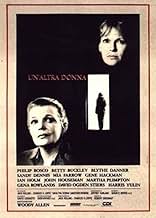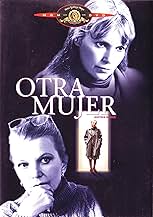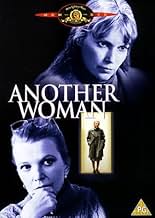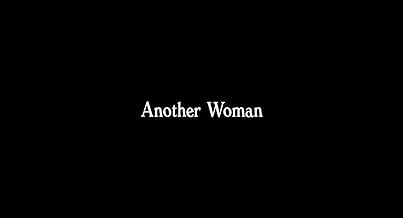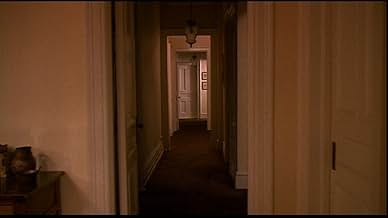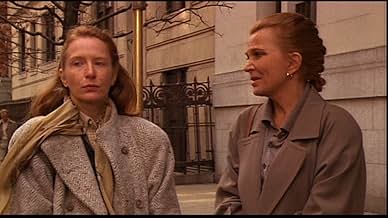Facing a mid-life crisis, 50-year-old college dean Marion Post takes a sabbatical and rents an apartment next to a psychiatrist's office to write a new book, then is drawn to the plight of a... Read allFacing a mid-life crisis, 50-year-old college dean Marion Post takes a sabbatical and rents an apartment next to a psychiatrist's office to write a new book, then is drawn to the plight of a pregnant woman seeking that doctor's help.Facing a mid-life crisis, 50-year-old college dean Marion Post takes a sabbatical and rents an apartment next to a psychiatrist's office to write a new book, then is drawn to the plight of a pregnant woman seeking that doctor's help.
- Awards
- 1 win & 3 nominations total
- Director
- Writer
- All cast & crew
- Production, box office & more at IMDbPro
Featured reviews
This is a wonderful movie but not an easy one. It mixes the present with the past and dreams with real life. You will need to see it three or four times at least to get the best out of it but it's well worth doing. Every performance is spot on, every scene has a purpose, there is no padding here. It comes as a shock to Gena Rowlands character that she is not what she thought she was, that people do not view her in the way she thought they did.She takes a journey through her life to see what went wrong with the unwitting aid of a psychiatrist and patient in the apartment next door. The film ends abruptly without a proper resolution just as life can and does. The final line of Gena Rowlands beautiful narration will haunt you. A masterpiece of writing and direction to say nothing of superb acting and masterful cinematography.
The melancholic mood and Gena Rowland's impressing acting are the most important elements of this movie. It's the Ingmar-Bergman type of film, like Interiors`, much more serious and thoughtful than all of Woody Allen's other movies, not at all typical for him. In my opinion, it's even more vivid than Interiors` because there are less people involved and something that happens less and less in Woody Allen's movies there is only one main character. This time, it's the character herself who tells the story which is really unusual for Allen.
By leaving every other trade mark in plot and topics away, Allen concentrates on the intellectual dialogues and the analyses people make about each other. It's characteristic that Marion Post is a professor for philosophy. She automatically analyzes everybody around her, which leads to the fact that they start analyzing her. Her crisis begins, when she learns that people talk about her which, of course, is something completely natural and therefore starts analyzing herself. Her character really impressed me because I know people myself who are exactly like Marion Post. Woody Allen is a brilliant psychologist who watches people precisely and that's why he is able to create such believable characters.
By leaving every other trade mark in plot and topics away, Allen concentrates on the intellectual dialogues and the analyses people make about each other. It's characteristic that Marion Post is a professor for philosophy. She automatically analyzes everybody around her, which leads to the fact that they start analyzing her. Her crisis begins, when she learns that people talk about her which, of course, is something completely natural and therefore starts analyzing herself. Her character really impressed me because I know people myself who are exactly like Marion Post. Woody Allen is a brilliant psychologist who watches people precisely and that's why he is able to create such believable characters.
There was a certain period in Woody Allen's career when he was trying desperately to imitate Ingmar Bergman's work. It rarely worked, and often turned out disasters like the execrable September. Another Woman is a riff on Bergman's Wild Strawberries: a college professor, played by Gena Rowlands, is past fifty and looking back on and reliving key events in her life as her present life is falling apart. The film is quite stagy at times, just as it was in September, Allen's previous film. He seems to think that adds something, but it really doesn't. One other problem Another Woman has is a couple of very clunky scenes, and a few poor bit performers, which were much bigger problems in September, which was actually the last Allen film that I saw and the one that made me subconsciously avoid him for the past several months. Allen's script here is excellent. He has produced an excellent character study which is probably unsurpassed in all of his other films that I've seen. The lead actors are wonderful here, Rowlands, Ian Holms, Blythe Danner, Sandy Dennis, and Gene Hackman. Allen's use of piano music is beautifully touching. It all adds up to a very touching and sad little film. It might not be Woody's best film, but it ought to be better respected and known. 8/10.
This is by far my favorite Woody Allen straight drama (most of his other "serious" films, like Crimes and Misdemeanors and Husbands & Wives, have comedic moments). His third "heavy film" (after Interiors and September) is chamber drama, beautifully acted and directed. Most of the elements found in Allen's other post "Annie Hall" films are here (the upper crust Manhattan intellectuals, dysfunctional relationships), but what's missing are the laughs. The film is very serious stuff, involving repressed emotions and alienation. There is simply no place for Woody's usually nervous character in Another Woman. You can still tell that this is one of his films because of the characterizations. Gena Rowlands is in nearly every scene and is classy, as usual, and the rest of the ensemble cast is just as good. My favorites were Gene Hackman and Ian Holm. The title is fairly clever as well; it doesn't refer to what you might think.
Devastating, unlike anything I've seen from Woody Allen so far. This was a very quiet, deliberately paced exploration into a woman facing a mid-life crisis, played with extraordinary skill by Gena Rowlands. It leaned maybe a little too much on narration when it could have utilized her talent as an actress instead, but that's a small complaint when the final result is so powerful.
Rowlands' Marion Post rents an apartment in order to work on her novel and, through hearing the patients of the psychiatrist's office next door, slowly begins to examine her life and the choices that she has made. We see her interact with those surrounding her, be it her husband, her daughter, her brother, but she always feels a level removed from all of them. Over the years she has isolated herself from everyone around her and examines them rather than interacts, and Rowlands plays this with a knowledge so fitting and serene.
There's an extended dream sequence a little over halfway through the picture that is one of the most surreal, emotional and illuminating experiences I've had in a Woody Allen picture and one of my favorite moments in the twenty or so films of his I've seen. It imagines her life as a stage play that she watches take place, and it opens the world back up to Marion, which is displayed in master strokes on the all-telling face of Rowlands. She gives a performance for the ages here, working mostly from the inside out, although there are a few devastating scenes of her letting herself fall apart.
I was surprised at how little Mia Farrow was in it, given that she's on the cover for it and the plot synopsis makes her part seem a lot more major, but she manages to leave an impression, although the most surprising of the supporting cast was Gene Hackman. I'm used to seeing him (and loving him) in varying crime pictures, so it was nice to see him take on a more grounded and every day character, which despite only appearing for a brief time he manages to leave a lasting impression with his emotionally conflicted portrayal. You can really feel this character that he displays, feel his love and heartache in every breath.
Still, the film absolutely belongs to Rowlands, who resonated so deeply inside of me and will surely stick there for a while. She knocks it out of the park in a film that is so unique, cerebral and magnificent from Woody Allen.
Rowlands' Marion Post rents an apartment in order to work on her novel and, through hearing the patients of the psychiatrist's office next door, slowly begins to examine her life and the choices that she has made. We see her interact with those surrounding her, be it her husband, her daughter, her brother, but she always feels a level removed from all of them. Over the years she has isolated herself from everyone around her and examines them rather than interacts, and Rowlands plays this with a knowledge so fitting and serene.
There's an extended dream sequence a little over halfway through the picture that is one of the most surreal, emotional and illuminating experiences I've had in a Woody Allen picture and one of my favorite moments in the twenty or so films of his I've seen. It imagines her life as a stage play that she watches take place, and it opens the world back up to Marion, which is displayed in master strokes on the all-telling face of Rowlands. She gives a performance for the ages here, working mostly from the inside out, although there are a few devastating scenes of her letting herself fall apart.
I was surprised at how little Mia Farrow was in it, given that she's on the cover for it and the plot synopsis makes her part seem a lot more major, but she manages to leave an impression, although the most surprising of the supporting cast was Gene Hackman. I'm used to seeing him (and loving him) in varying crime pictures, so it was nice to see him take on a more grounded and every day character, which despite only appearing for a brief time he manages to leave a lasting impression with his emotionally conflicted portrayal. You can really feel this character that he displays, feel his love and heartache in every breath.
Still, the film absolutely belongs to Rowlands, who resonated so deeply inside of me and will surely stick there for a while. She knocks it out of the park in a film that is so unique, cerebral and magnificent from Woody Allen.
Did you know
- TriviaUnlike most actors and actresses in Woody Allen's movies, Gena Rowlands was allowed to read the entire script before taking the part.
- GoofsWhilst it is true that the tune of Gymnopédie No. 1 is played at the beginning of the film, it is not the piano version but rather the orchestral version orchestrated by Debussy. For some unknown reason, Debussy changed the numbers of the Gymnopédies: thus the orchestral version of Gymnopédie No. 3 bears the tune of Gymnopédie No. 1!
- SoundtracksGymnopédie No 1
Music by Erik Satie
Performed by Orchestre de la Société des Concerts du Conservatoire
Conducted by Louis Auriacombe
Courtesy of EMI Pathé-Marconi/Capitol Records Special Markets
- How long is Another Woman?Powered by Alexa
Details
Box office
- Budget
- $10,000,000 (estimated)
- Gross US & Canada
- $1,562,749
- Opening weekend US & Canada
- $75,196
- Oct 16, 1988
- Gross worldwide
- $1,562,749
Contribute to this page
Suggest an edit or add missing content


